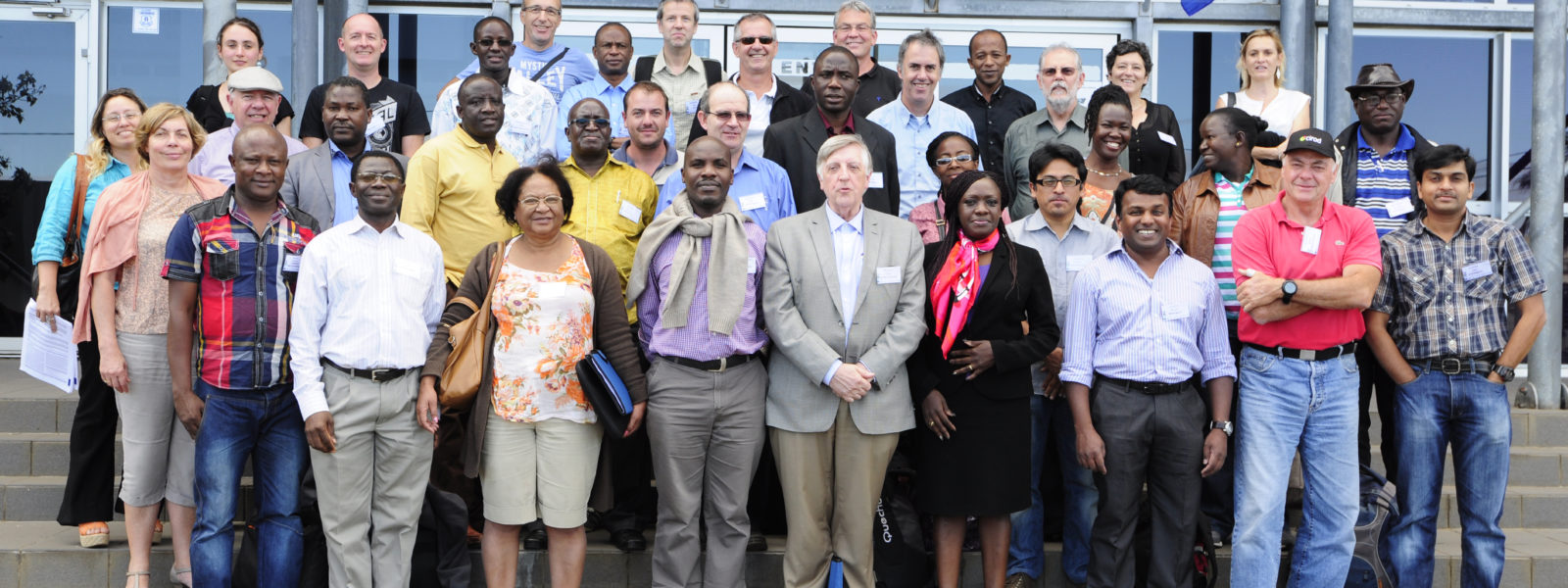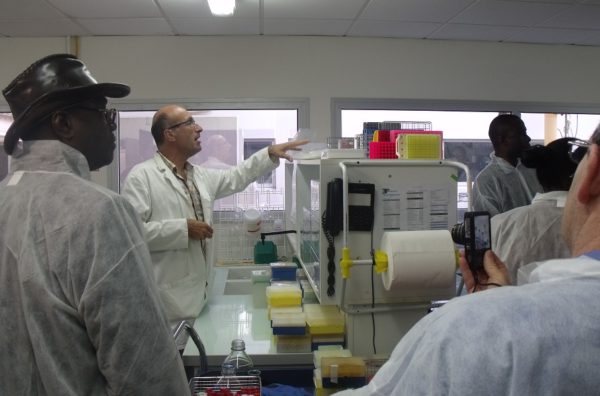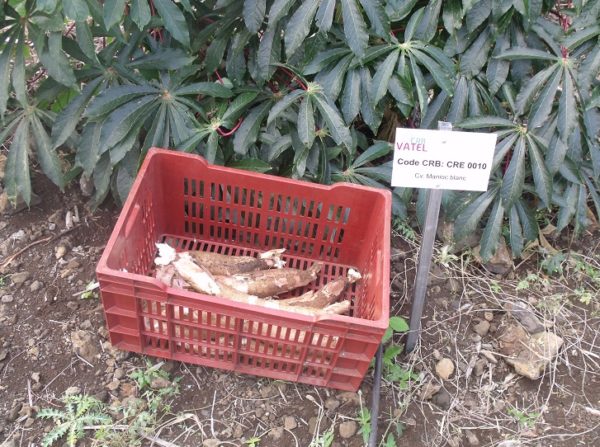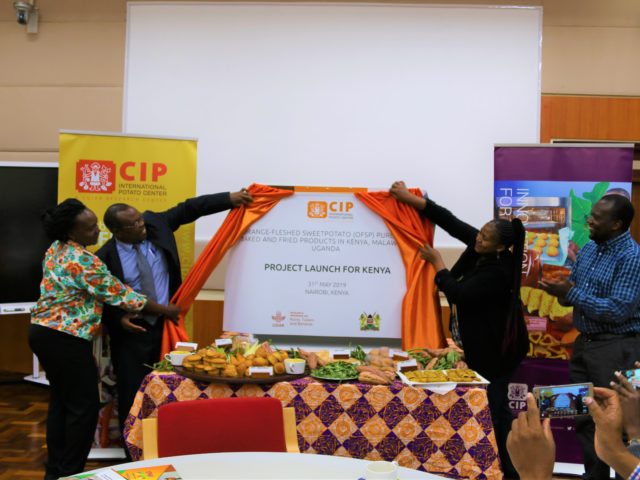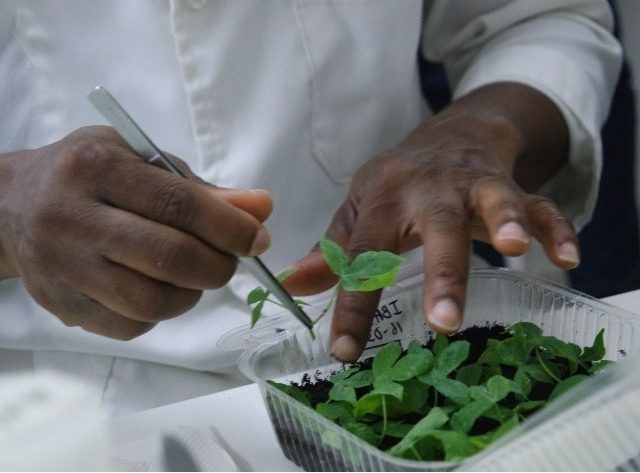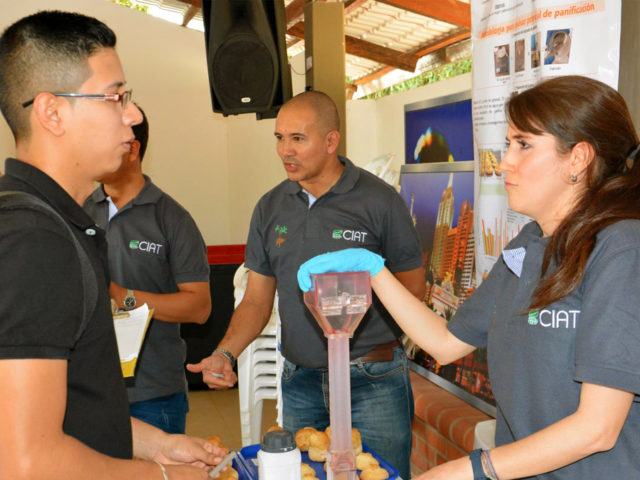Scientists from international agricultural research centers and African national and regional institutions met in Saint-Pierre, La Réunion from June 10 to 13 to contribute to a war on cassava pests and diseases that threaten the food security and livelihoods of millions of Africans. The meeting resulted in the establishment of a Pan-African Cassava Surveillance Network – PACSUN, among other initiatives.
More than 40 cassava experts from African national and regional organizations and the French Agricultural Research Centre for International Development (CIRAD) and Research Institute for Development (IRD) attended the workshop on the French island of La Réunion. The meeting – an initiative of the Global Cassava Partnership for the 21st Century (GCP21) – was the first step in implementing a roadmap to improve management of cassava viruses and bacteria in Africa. The roadmap resulted from a meeting of cassava specialists held at the Rockefeller Foundation Center in Bellagio, Italy in May 2013, and was recently published in the journal Food Security. Among the various measures it calls for, is the creation of a Pan-African Cassava Surveillance Network (PACSUN).
Dr. Hortense Atta Diallo, the director of the Plant Production Research Pole at Nangui Abrogoua University in Côte d’Ivoire, is enthusiastic about PACSUN’s potential. “I already lead a project that mapped cassava diseases in my country. Through this new network, we can pool all our activities and find solutions that will improve the lives of cassava producers,” she said.
As part of the workshop, the scientists visited the state-of-the art laboratory and field experimental station facilities at the 3P Center in Saint-Pierre. They also met with 3P Center scientists whose work on aspects of plant health such as virology, bacteriology, entomology, tissue culture and DNA technologies will contribute to the diagnosis, surveillance and control for cassava diseases in Africa.
“With partnerships of over 10 institutions, we will have more knowledge, more funds and more speed in tackling the problem of cassava diseases,” said Dr. Maruthi Gowda, a scientist at the Natural Resources Institute, University of Greenwich, UK.
Workshop participants discussed several international initiatives for the coming years:
1- Establishment of a Pan-African Cassava Surveillance Network (PACSUN) comprising members of existing networks and organizations, extension services, NGOs and policy makers in Africa. PACSUN will provide diagnostic expertise and information about the viral and bacterial diseases infecting cassava in Africa; consolidate data on one website; use advanced mobile phone technologies to reach the most remote farmers; and coordinate appropriate responses in each country to halt or slow the spread of diseases such as the cassava brown streak disease.
2- Establishment of an International Cassava Transit site in La Réunion. The exchange of cassava material between countries in Africa or other continents is currently banned due to the risk of spreading cassava mosaic disease (CMD) and cassava brown streak disease (CBSD). La Réunion, where cassava is not infected by these viral diseases, will act as a transit site where cassava can be checked for viruses and bacteria and where crosses could eventually be made to produce seeds for export without risk of spreading viruses. The experts at the 3P Center will work with regional and international centers to perform relevant tests for all known cassava viruses and bacteria.
3- Development of a website that will provide the cassava community with information on PACSUN members, updated information about the geographical distribution of all cassava viral and bacterial diseases in the world and the harmonized protocols for proper and efficient diagnostic of viruses, bacteria and whitefly vectors.
4- Development of diagnostic technologies to better identifying viruses and bacteria infecting cassava and the whitefly vectors responsible for the rapid spread of viral diseases throughout the continent. A network of international, regional and national diagnostic laboratories (Cassava Diagnostic Network in Africa – CDNA) will be established to better serve PACSUN.
5- Development of a comprehensive educational and training plan to support the activities of PACSUN. This will include the organization of technical and scientific training courses to ensure the transfer of diagnostic technologies to each country in the network and outreach through various channels to ensure that all stakeholders have the knowledge needed to improve management of cassava diseases.
The workshop was supported by the CGIAR Research Program on Roots, Tubers and Bananas (RTB), Agropolis Fondation, IRD, the European Union, the Région Réunion, the University of La Réunion, PPRSREC (Plateforme Régionale Pluridisciplinaire “Sociétés rurales, Environnement et Climat en Afrique de l’Ouest”) and Investissements d’Avenir.
GCP21 is an independent non-profit organization collaborating with several CGIAR Research Programs and an array of research and development (R&D) organizations working with cassava around the world. GCP21 organizes meetings and conferences on a variety of cassava topics aimed at filling gaps in R&D, promoting international funding for cassava R&D, triggering the production of industrial products from cassava, and providing a range of information about the crop and the scientists working on the crop. GCP21’s ultimate goal is to increase cassava productivity in the world. (http://gcp21.ciat.cgiar.org)
CIRAD is a French research centre working on international agricultural and development issues with a staff of 1800, including 800 researchers. CIRAD’s activities involve the life sciences, social sciences and engineering sciences, applied to agriculture, food and rural territories. CIRAD works hand-in-hand with local people and the local environment, on complex, ever-changing issues: food security, ecological intensification, emerging diseases, the future of agriculture in developing countries, etc. CIRAD has a global network of partners and of twelve regional offices, from which it conducts joint operations with more than 90 countries. Its bilateral partnerships fit in with multilateral operations of regional interest. CIRAD has an active policy for the training of young researchers in particular through a special recruitment programme for PhD students from the South. www.cirad.fr .
IRD (Institut de Recherche pour le Développement) is a French public sector institution working in science and technology, and entirely dedicated to research for development. It is jointly governed by the French ministries for research and for development. Operating from headquarters in Marseille, with two main sites in Bondy and Montpellier (France), IRD is active in over fifty countries, in Africa, around the Mediterranean basin and in Latin America, Asia and the French tropical overseas territories. IRD seeks to confront the major challenges in research for development by carrying out research, training and innovation missions in South countries – for their benefit and in partnership with them. Based on an interdisciplinary approach, the projects developed with our partners address issues of crucial importance for the South: tropical and lifestyle diseases, food safety, climate change, water resources, biodiversity, social development, vulnerability, and inequality, migration in order to achieve the Millennium Development Goals. www.ird.fr
The CGIAR Research Program on Roots, Tubers and Bananas (RTB) is an international collaboration of agricultural research centers working on cassava, potato, sweet potato, yam, banana, plantain and other roots and tubers that aims to improve the food security, nutrition and livelihoods of some of the world’s poorest families. It combines the expertise and resources of the International Potato Center (CIP) as the lead center, Bioversity International, the International Center for Tropical Agriculture (CIAT), the International Institute of Tropical Agriculture (IITA) and French partners represented by the French Agricultural Research Centre for International Development (CIRAD). www.rtb.cgiar.org
Agropolis Fondation is a French scientific foundation established in 2007 to promote and support high-level research and higher education (training-through-research) as well as to broaden international research partnerships in agricultural sciences and sustainable development research. It supports projects with fellowships, doctoral and post-doctoral grants and other awards that enable leading and promising international scientists to work with the Foundation’s scientific network in Montpellier thereby facilitating knowledge exchange and international partnerships. It supports research initiatives on five domains: (i) Genetics and genomics, plant breeding, eco-physiology; (ii) integrated crop protection, (iii) Agro-ecosystems and resource management ; (iv) Agri-food systems and non-food materials ; (v) Innovation processes and social management of innovation. http://www.agropolis-fondation.fr
